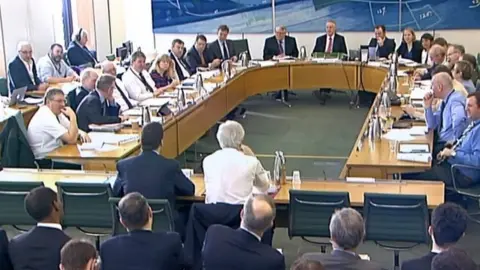Week ahead in Parliament
 HoC
HoCParliament continues to mark time, with business in both Houses dominated by general debates and uncontroversial legislation.
But beneath the surface, Westminster life seethes with intrigue.
On the government side, the position of the prime minister and the ambitions of would-be successors are the subject of endless speculation, which means that all kinds of occasions can morph into opportunities for possible contenders to, ever so subtly, strut their stuff.
With the elections for select committee chairs due on Wednesday, there are plenty of MPs pursuing influential perches on the committee corridor.
The biggest prize is probably the chair of the Treasury Committee - vacated by Andrew Tyrie, who stood down at the last election; but the chairs of the Education and Business, Energy and Industrial Strategy Committees are also open.
And, as some old-stagers shake their heads, two incumbent chairs, Julian Lewis in Defence, and Crispin Blunt in Foreign Affairs, are being challenged.
Long-serving Foreign Affairs Committee member John Baron is seeking the chair of that committee, as is Tom Tugendhat from the 2015 intake. Another new-ish MP, Johnny Mercer is seeking the chair of Defence - will the torch be seized by a younger generation?
The key to understanding these races is that, where several MPs from one party are contesting a post, the winner is the one with the most appeal to the other parties - so Labour MPs, in effect, will pick the winner in hotly contested elections like the one for the Treasury Committee chair.
Elsewhere the All-Party Parliamentary Groups are springing into action...Margaret Hodge's APPG on tax, which is zeroing-in on a particularly sensitive political issue, is taking shape, and the APPG on cancer is launching its second inquiry into NHS England's Cancer Strategy, which will feed into a 'Britain Against Cancer' conference in Westminster on 5 December.
Here's my rundown of the week ahead:
Monday
The Commons week begins (2.30pm) with Defence Questions - providing a final chance for the contenders for the post of Defence Committee chair, the incumbent, Julian Lewis, and his challenger, Johnny Mercer, with a final audition for the job.
 Eyewire
EyewireThe day's legislating is on the second reading of the Telecommunications Infrastructure (Relief from Non-Domestic Rates) Bill - which scraps business rates on new ultrafast broadband lines as part of the government's drive to speed up Britain's move to ultrafast broadband and 5G mobile coverage.
Older telecoms infrastructure will still be taxed as the government seeks to encourage a switch to "gold standard" fibre optics rather than upgrades to get better performance from old-style copper telephone lines.
In the Lords (2.30 pm) questions to ministers include one on setting up a Data Ethics Commission from the former CEO of TalkTalk, the Conservative, Baroness Harding of Winscombe. The day's main debate is on the current security situation in the UK - with 20 peers listed to speak at the time of writing.
The Commons meets at 11.30am for Foreign Office Questions (watch out for a bit of competition between Messrs Blunt, Baron and Tugendhat) with any statements or urgent questions following at 12.30pm.
Slightly to everyone's surprise, the Commons will then deal with the detail of the Air Travel Organisers' Licensing Bill - given its second reading this week - in a committee of the whole House, with report stage and third reading following immediately after.
There has already been some Opposition chuntering that the government should have set up a bill committee, and some speculation about why they have not. Some accuse ministers of trying to bog down the House in legislative chores and general debates, because they dare not put controversial legislation before MPs. Expect these complaints to intensify, if this continues.
One piece of controversial legislation is expected to appear - but only to be presented, not debated. The Great Repeal Bill, as it will not be called, because Commons rules prohibit argumentative titles for legislation, will be formally published this week - with rumour pointing for Tuesday as the day for the formalities to be enacted. The actual second reading debate will not be until September, at the earliest.
The adjournment debate, led by the Conservative, Sir Paul Beresford, is on Section 136 of the Mental Health Act 1983 - an emergency power which allows the police to remove an apparently mentally disordered person from a public place to a place of safety, for up to 72 hours.
In Westminster Hall, the former Conservative chief whip Mark Harper - now on the backbenches - leads a debate (9.30am-11am) on balancing the public finances. There has been a lot of internal criticism that the Conservatives have failed to make the intellectual case for austerity, in the face of Jeremy Corbyn's attacks on spending cuts.
The newly elected Lib Dem Layla Moran discusses the role of children's centres in tackling social inequality (11am-11.30 am) and in the afternoon, Labour's Lucy Powell has a longer debate (2.30pm- 4pm) on government policies on social mobility - her aim is to give MPs a chance to debate the recent Social Mobility Commission report, Time for change: an assessment of government policies on social mobility 1997-2017, with ministers.
She has been carving out a niche as a social mobility campaigner since she left the Labour frontbench, and will use the debate to renew her calls (made with Nicky Morgan and Nick Clegg in the last Parliament) for more cross-party joint working on what works for social mobility. With the sensitive subject of grammar schools likely to feature, it may also see a bit of last-minute campaigning from candidates for the chair of the Education Committee.
The SNP's Dr Lisa Cameron has a debate (4.30pm-5.30pm) on consultation with disabled people on the effect on their services of the UK leaving the EU.
 AFP/Getty
AFP/GettyIn the Lords (2.30pm) the usual half hour of questions to ministers is followed by an order to extend non-jury trials in Northern Ireland.
Then peers will turn to the second reading of the Armed Forces (Flexible Working) Bill - which would allow for part time and flexible working arrangements for armed forces personnel: the idea is that the conditions of service must offer recruits a career that better reflects the realities of modern life - it is hoped that allowing greater flexibility over how long and where people work will help attract and keep the talent the forces need.
There will also be a short debate on the diplomatic crisis in the Gulf region and the steps being taken to de-escalate tensions and encourage Qatar to engage with its neighbours about their concerns about extremism.
The Commons begins (11.30am) with International Development Questions, followed at noon by Prime Minister's Questions.
These occasions may not have much cut-through with the public most of the time, but are increasingly critical for Conservative Party morale.
The rest of the day is devoted to a debate on the Grenfell Tower fire inquiry. One strand of this is the increasing pressure from senior MPs for some kind of parliamentary role in drawing up the terms of reference of major inquiries, and appointing the chair.
The PM is the 'sponsoring minister' for the inquiry and as a result the department handling arrangements is the Cabinet Office.
In Westminster Hall, the first debate (9.30am-11am) is on negotiations on the UK's future Euratom membership - the Labour MP Albert Owen (one of the contenders for the chair of the business and energy select committee) will warn of problems ahead if the UK leaves the EU atomic energy agency without making transitional arrangements to allow for the purchase of nuclear materials and technology from member nations, and maintain monitoring arrangements for British nuclear facilities.
An amendment highlighting the possible problems from leaving Euratom as part of the Brexit process did gain some traction during the debates on the bill to invoke Article 50, earlier this year, and Mr Owen anticipates some cross-party support and pressure on the government, during this debate.
In the afternoon, the Telford MP, Lucy Allan, leads a debate (2.30pm-4pm) on the challenges facing new towns.
But it is the debate on abuse and intimidation of candidates and the public in UK elections (4.30pm-5.30pm) that promises to be the most rancorous of the week. Expect much finger-pointing, with a number of MPs seeking payback for some bruising experiences during the campaign. The debate will be led by the Conservative backbencher, Simon Hart, who says many candidates faced "numerous acts of vandalism, abuse, intimidation and general thuggishness - especially online".
He wants to use the debate to raise the wider question of the impact of all this on recruitment and retention of candidates, public attitudes to voicing support for individuals, reporting and ultimately electoral outcomes. Intriguingly he also wants to pose the question: "what is acceptable online activity from opponents in public office?"
In the Lords (3pm) there's an interesting looking question to the Leader of the House from Labour's Lord Soley on proposals "to create a close and constructive relationship between the House of Lords and the European Parliament".
 PA
PAThen peers come to the final frontier, the second reading of the Space Industry Bill - it is less exciting than it sounds; the bill is concerned with providing a legal framework for a projected British spaceport.
Space technology is one of the UK's unsung industries, and the government is keen to expand it, by licensing a British spaceport ahead of rival countries like Portugal, which wants a launch facility in the Azores.
There are a number of rival sites in Cornwall and Scotland which might become the home for a launch facility, although the vehicles concerned will be aircraft lifting space vehicles to high altitude rather than Cape Canaveral style rockets. Before the election, the Commons Science and Technology Committee had run an inquiry into a draft version of the bill, and now peers will boldly legislate where no peer has legislated before.
That is followed by a short debate on risks to NHS sustainability arising from the United Kingdom's departure from the European Union - led by the former health minister, Lord Warner, who resigned the Labour whip in 2015 and now sits as a non-affiliated peer.
Of course, in the Lords, their select committees are up and running - and their EU Committee meets (at 4pm) with the Secretary of State for Exiting the EU, David Davis, to discuss Brexit, the first round of negotiations, engagement with Parliament, citizens' rights and devolution.
The Commons opens (9.30 am) with Transport Questions, which could see the debut of whoever is elected as the new chair of the Transport Select Committee. And then comes the weekly Business Statement from the Leader of the House, Andrea Leadsom.
The main debate is a Commemoration of Passchendaele, the third battle of Ypres, one of the bloodiest of the First World War. The figures are disputed but there were an estimated 240,000 British, 8,525 French and 260,000 German casualties. One MP to watch will be the Conservative military historian Keith Simpson, who intends to look at the blunders by the generals who planned the allied offensive.
Expect a number of MPs to speak about the sacrifices made by their ancestors, and to point to the losses sustained by New Zealand soldiers.
The adjournment debate, led by the Conservative, Alec Shelbrooke is on the prosecution of driving offences committed on private land - it follows from the death of nine-year-old Harry Whitlam killed by a drunk driver in a farmyard, in 2015.
Because this happened on private land the driver could only be prosecuted under health and safety legislation - and Mr Shelbrooke will be calling for a change in the law.
In the Lords (11 am) the Plaid Cymru peer Lord Wigley has a question on the sensitive issue of changes to the Barnett formula for Wales and Scotland arising from additional financial provision for Northern Ireland which follows the government's deal with the Northern Ireland Democratic Unionists.
A series of Labour backbench debates on public service issues follows, with Baroness Andrews raising the impact of deregulation on public services, health and safety; Lord Haskel the cap on public sector pay and Lord Kennedy of Southwark on local government finance and arrangements beyond 2020.
There's also a short debate on security challenges and related human rights violations on the Korean peninsula led by Lord Alton of Liverpool.
Neither House sits on Friday.
